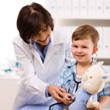
Get ready for questions about “immune boosters.” Many parents want to know what they can do to keep their kids healthy. Here’s some guidance for this tricky area.
Vitamin C is a very common ingredient in immune booster supplements. Well-known products like Emergen-C contain 1,000 mg per packet. While parents might be tempted to load their kids up on these prophylactically, explain that taking high-dose vitamin C doesn’t seem to reduce the risk of getting a cold. But there is some evidence that it might reduce symptoms and the length of a cold once kids are sick. As for safety, it’s important to keep doses below the tolerable upper intake level (UL) based on their child’s age. Children 4 to 8 years-old shouldn’t take more than 650 mg of vitamin C daily, so they should stay away from those Emergen-C packets. Kids 9 to 13 years-old should stay under 1200 mg daily. Higher doses can cause side effects, including diarrhea and stomach upset.
You might also get questions about zinc. Explain that taking zinc lozenges might help treat colds in adults, but there isn’t any strong clinical evidence that it can help treat or prevent colds in kids. For now, it’s probably not worth trying. There aren’t any safety concerns when it’s used in doses under the UL, but high doses of zinc might reduce copper absorption and cause anemia.
Probiotics are increasingly getting attention for immune support. And there’s some promising evidence on specific probiotic species, particularly Lacticaseibacillus rhamnosus. One large clinical trial shows that children who attend daycare centers get fewer and less severe respiratory infections when they’re given milk containing Lacticaseibacillus rhamnosus GG (Culturelle) daily. It’s likely safe for most kids and generally well-tolerated.
Finally, be prepared to answer questions about herbal ingredients like echinacea. Taking echinacea while healthy might modestly reduce the risk of getting a cold. But explain that most research has evaluated its effects in adults, and there are concerns about allergic reactions in kids. Some kids might develop an allergic skin rash – allergic reactions could be more severe in other children.
Unfortunately, there’s no magic pill to ward off a cold. Remind parents that the best thing they can do is ensure their kids are getting adequate nutrition through food as well as proper sleep. And a refresher course on hand washing hygiene is always a good idea. If they do get sick, focus on managing symptoms and keeping them hydrated.
The information in this brief report is intended for informational purposes only, and is meant to help users better understand health concerns. This information should not be interpreted as specific medical advice. Users should consult with a qualified healthcare provider for specific questions regarding therapies, diagnosis and/or health conditions, prior to making therapeutic decisions. Copyright © 2025 NatMed. Commercial distribution or reproduction prohibited. NatMed is the leading provider of high-quality, evidence-based, clinically-relevant information on natural medicine, dietary supplements, herbs, vitamins, minerals, functional foods, diets, complementary practices, CAM modalities, exercises and medical conditions. Monograph sections include interactions with herbs, drugs, foods and labs, contraindications, depletions, dosing, toxicology, adverse effects, pregnancy and lactation data, synonyms, safety and effectiveness.
